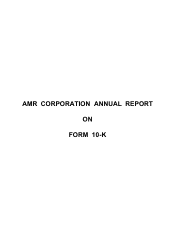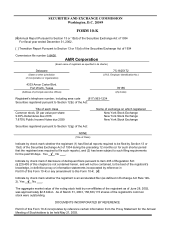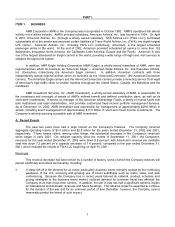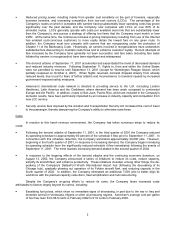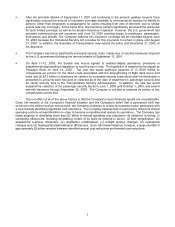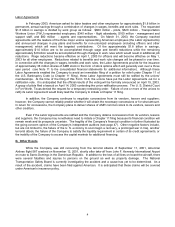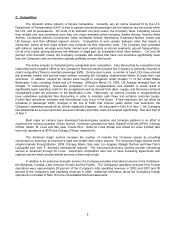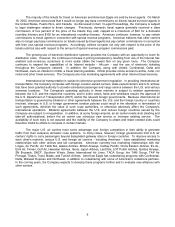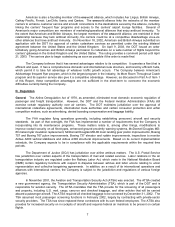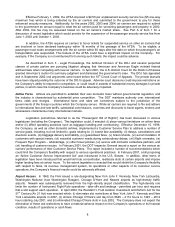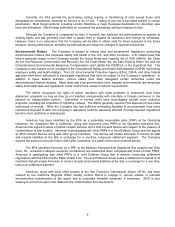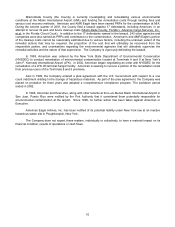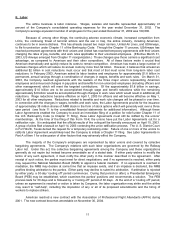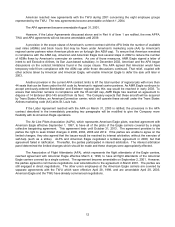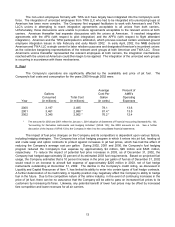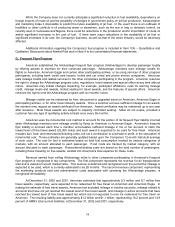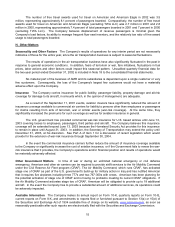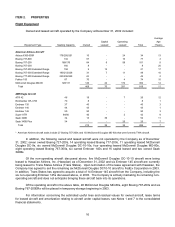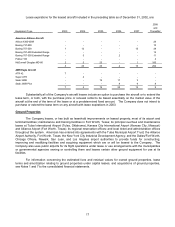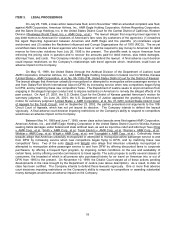American Airlines 2002 Annual Report Download - page 10
Download and view the complete annual report
Please find page 10 of the 2002 American Airlines annual report below. You can navigate through the pages in the report by either clicking on the pages listed below, or by using the keyword search tool below to find specific information within the annual report.8
Effective February 1, 2002, the ATSA imposed a $2.50 per enplanement security service fee ($5 one-way
maximum fee) which is being collected by the air carriers and submitted to the government to pay for these
enhanced security measures. Additionally, for the years 2002, 2003 and 2004, air carriers are required to submit
to the government an amount equal to what the air carriers paid for screening passengers and property in 2000.
After 2004, this fee may be assessed based on the air carrier’s market share. See Part A of Item 1 for a
discussion of recent legislation which would provide for the suspension of the passenger security service fee from
June 1, 2003 until October 1, 2003.
In addition, the ATSA requires air carriers to honor tickets for suspended service on other air carriers that
are insolvent or have declared bankruptcy within 18 months of the passage of the ATSA. To be eligible, a
passenger must make arrangements with the air carrier within 60 days after the date on which the passenger’s air
transportation was suspended. This feature of the ATSA could have a significant impact on the Company. For
example, if the Company is not reimbursed for honoring such tickets, the impact could be adverse.
As described in Item 3 - Legal Proceedings, the Antitrust Division of the DOJ and several purported
classes of private parties are pursuing litigation alleging that American and American Eagle violated federal
antitrust laws when competing with new air carriers. In April 2001, the U.S. District Court for the District of Kansas
granted American’s motion for summary judgment and dismissed the government’s case. The DOJ has appealed
and in September 2002 oral arguments were heard before the 10th Circuit Court of Appeals. The private lawsuits
have been stayed pending the outcome of the DOJ’s appeal. Adverse court decisions could impose restrictions on
the Company’s ability to respond to competitors, or could result in awards of substantial money damages to private
parties, in which case the Company’s business could be adversely impacted.
Airline Fares Airlines are permitted to establish their own domestic fares without governmental regulation, and
the industry is characterized by substantial price competition. The DOT maintains authority over international
fares, rates and charges. International fares and rates are sometimes subject to the jurisdiction of the
governments of the foreign countries which the Company serves. While air carriers are required to file and adhere
to international fare and rate tariffs, substantial commissions, overrides and discounts to travel agents, brokers and
wholesalers characterize many international markets.
Legislation (sometimes referred to as the “Passengers’ Bill of Rights”) has been discussed in various
legislatures (including the Congress). This legislation could, if enacted: (i) place various limitations on airline fares
and/or (ii) affect operating practices such as baggage handling and overbooking. Effective December 15, 1999,
the Company, as well as other domestic airlines, implemented a Customer Service Plan to address a number of
service goals, including, but not limited to, goals relating to: (i) lowest fare availability, (ii) delays, cancellations and
diversion events, (iii) baggage delivery and liability, (iv) guaranteed fares, (v) ticket refunds, (vi) accommodation of
customers with special needs, (vii) essential customer needs during extraordinary delays, (viii) flight oversales, (ix)
Frequent Flyer Program – AAdvantage, (x) other travel policies, (xi) service with domestic codeshare partners, and
(xii) handling of customer issues. In February 2001, the DOT Inspector General issued a report on the various air
carriers’ performance of their Customer Service Plans. The report included a number of recommendations which
could limit the Company’s flexibility with respect to various operational practices. In February 2001, a bill proposing
an “Airline Customer Service Improvement Act” was introduced in the U.S. Senate. In addition, other items of
legislation have been introduced that would limit hub concentration, reallocate slots at certain airports and impose
higher landing fees at certain hours. To the extent legislation is enacted that would inhibit the Company’s flexibility
with respect to fares, its revenue management system, its operations or other aspects of its customer service
operations, the Company’s financial results could be adversely affected.
Airport Access In 1968, the FAA issued a rule designating New York John F. Kennedy, New York LaGuardia,
Washington National (now Washington Reagan), Chicago O'Hare and Newark airports as high-density traffic
airports. Newark was subsequently removed from the high-density airport classification. The high-density rule
limits the number of Instrument Flight Rule operations - take-offs and landings - permitted per hour and requires
that a slot support each operation. In April 2000, the Wendell H. Ford Aviation Investment and Reform Act for the
21st Century (Air 21 Act) was enacted which: (i) eliminates slot restrictions at New York John F. Kennedy and New
York LaGuardia airports in 2007, (ii) shrank Chicago O’Hare’s slot day from 0645 – 2114 hours to 1445 – 2014
hours starting July 2001, and (iii) eliminated Chicago O’Hare slots in July 2002. The Company does not expect the
elimination of these slot restrictions to have a material adverse impact on the Company’s operations or its financial
condition, results of operations or cash flows.

